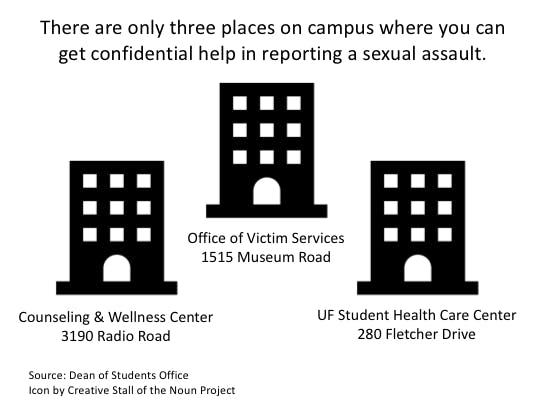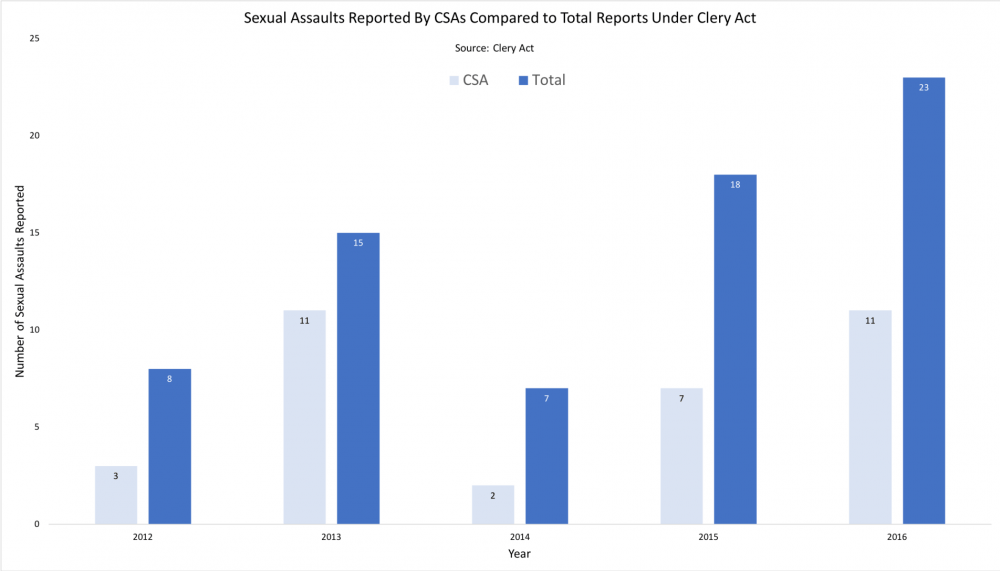When the knock on her door came, Avnee Mistry was prepared.
Two of the girls from Mistry’s Beaty Towers hall, where she was a resident assistant, stood outside under the fluorescent lights, hoping someone was on the other side of the door.
There was an incident, one of the girls explained, in shock. Without words, Mistry knew something bad had happened.
The second girl was quiet, letting her friend speak for her. She had been crying.
They wanted to talk, so they chose their RA, someone they felt close to. Going to the police felt scary for the freshmen, and they didn’t know what else to do.
“You don’t want to assume the worst, but it’s always in the back of your mind as a worry,” Mistry, 21, said.
But before they could speak, Mistry had to disclose the limits of her confidentiality.
Their next words would have to be reported, Mistry explained.
“I can promise you privacy, but I can’t promise you confidentiality,” she said.
As an employee of UF, she had a legal obligation to report to UF’s Title IX office, the office that manages sexual harassment and sexual assault investigations.
When students tell their professors, club advisers, resident assistants or more about a sexual assault that happened to them, that information must be passed forward. Only three resources on campus, the Office of Victim Services, the Counseling & Wellness Center and the UF Student Health Care Center, offer complete confidentiality.
Students can also seek confidential legal help through Student Legal Services and the Intimate Partner Violence Assistance Clinic, which is based out of the Levin College of Law. Confidentiality is guaranteed based on attorney-client privilege.

Hailey Brown, a victim advocate with the Office of Victim Services, said students may not know what resources are confidential and which aren’t.
If they seek a confidential resource first, they can learn all their options and choose the path that feels most comfortable.
But if they confide in another employee first, they may be set down one path without realizing it.
“Once you tell someone that maybe isn’t confidential, it kind of spirals out of your hands,” she said.
Russell Froman, the director of the Title IX office, said they always work with the student to make them as comfortable as they can be.
“I make sure they are aware of the situation when we begin,” Froman said. “There’s no ‘gotchas,’ there’s no surprises.”
When the Title IX office gets word of an assault, they put together a preliminary report outlining who is involved and the incident’s details.
A student doesn’t get to choose whether to have the initial report put together if the information is already with the office, but they can choose what next steps to take, Froman said.
“I think people think they are going to be forced to move forward, which is not the case,” he said.
The Title IX office will work with the victim to help get them resources like academic accommodations or rooming changes, he said. They’ll also conduct an investigation to send to the Student Conduct Office if a victim chooses.
Tanja Philhower, the assistant dean of students, said there’s nothing new about people reporting their sexual assaults to people other than the police.
“Reporting to law enforcement feels really significant and really overwhelming,” she said.
Philhower, who used to be a victim advocate, said people may worry they would ruin the life of the person who assaulted them by reporting to police, especially if the person was a peer.
She also said people naturally seek out those they’re close with, like RAs and professors, thinking they’re confidential.
“I think it is difficult to provide that clarity for people about where there are confidential resources and where there are not,” she said.
Philhower works with the U Matter, We Care team — but she said having a victim of sexual assault email them directly isn’t the best option, because they then have to disclose the information, when the victim may not have known all their choices.
Sometimes, it’s not even the student who sends an email, but a friend or a parent. A report on the student will still have to be fi led — even if they didn’t know about the email. A well-meaning parent can put the student through a process they didn’t expect, Philhower said.
“It still can feel really outing and feel re-traumatizing when there’s a mandatory report that has to be made,” she said.
Brown said more people tend to seek action with UF rather than with law enforcement if they move forward, but there’s no one way someone processes sexual assault.
Some seek the law. More seek disciplinary action. And some just don’t want to think about it.
But they may not know all of the options, or the best option for them, if they don’t go to a group like Victim Services first.
In 2017, Brown’s office saw 67 people come through to discuss sexual assaults in confidence, 60 of them students. From 2014 to 2017, nearly 200 people came to the office to discuss sexual assault.
The office helps victims with anything they may need — they’ll sit with them in court rooms and hospital rooms, answer their late-night calls and tell them whatever they need to know.
“You can come here and explore all your options,” she said.
The only thing Victim Services passes along are details of an on campus assault, without names or identifying information, to University Police through the Campus Security Authority program.
The Campus Security Authority program was created under the Clery Act, a federally mandated program that requires colleges to report on-campus crimes.
Major Brad Barber from UPD said not all victims, especially with assault, come to the police. Some of UF’s 1,400 Campus Security Authorities — people like professors, housing staff, security guards and Student Nighttime Auxiliary Patrol drivers — pass along information about on-campus crimes so the police have a better count.

Of reported on-campus sexual assaults in 2016, only 10 of a total 23 individuals reported directly to the police. Eleven were passed through Campus Security Authorities.
In 2015, a year with 18 reported on-campus sexual assaults, seven students reported to the police. Barber said Campus Security Authorities encourage victims to go to the police, but it’s a personal decision.
“We have seen a slight increase (in reporting to Campus Security Authorities) over the years, which I think is a direct result of our continuing efforts to assist those in need and provide alternatives to reporting to law enforcement,” Barber said.
Rita Lawrence, the Interpersonal Violence Coordinator at GatorWell, said she knows when someone is assaulted, they almost always turn to a friend first.
“Criminal justice numbers are ever only going to catch a small portion of people reporting because most survivors choose not to report to police,” she said.
Lawrence encourages people to go to a confidential office, like Victim Services, first to learn their options.
Gizem Toska, a licensed psychologist with the Counseling & Wellness Center, said they have emergency walk-in appointments available to students from 9 a.m. to 4 p.m. every day. They also screen students’ paperwork for references to sexual assault and would then call the student right away, she said.
They’ll never push a student to reveal more or do anything they don’t want, she said — a benefit of being confidential.
“An assault is a significant boundary breach,” Toska said. “So as providers, we will be as sensitive as possible to not do further harm while trying to help.”
She said speaking out and leaving that confidential space happens at a different pace for everyone. “It’s okay if you’re not ready, and it’s okay if you are ready,” she said.
Staff Writer Meryl Kornfield contributed to this report.
Contact Romy Ellenbogen at rellenbogen@alligator.org. Follow her on Twitter at @romyellenbogen.





